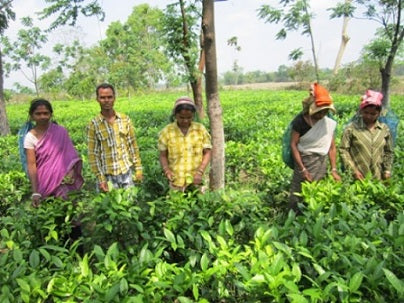
British pioneered large tea plantations in Assam during the colonial time, in the early 19th century. Most of the workers working in the tea plantations of Assam today are descendants of tribal groups from central India originally trafficked to Assam during British rule..
After independence, large Indian companies based elsewhere in the country entered the fray to become the biggest producers of the coveted Assam Tea. But, the life of the tea workers or the local economy of the region did not change much even after 60 years of India's independence. Tea workers in most of the tea gardens in Assam are paid absurdly low wages (around 95/- Rupees a day) even today. Poor economic condition and welfare issues among the tea worker community have resulted in social unrest in the region from time to time.
The huge tea industry of north east India (particularly Assam), historically did not provide much contribution to the local economy either. Lack of livelihood opportunities for young people of the region gave birth to insurgency in early 1990's. Somewhere around this time, some of the enterprising families in Assam including some of the tea workers began to grow tea for self-employment, creating a whole new community called small tea growers community.
 The small tea growers community has been successful to bring in a green revolution to rural Assam and today contributes around 29% of the total tea produced in Assam. However, due to the fact that most of these small growers don't have access to the financial support needed to setup their own tea factory, they sell their green leaves to bought-leaf factories owned by big companies, at an average price of 20/- Rupees per kilo. There have been news about price of small grower tea leaves going down to even 7 Rupees per kilo.
The small tea growers community has been successful to bring in a green revolution to rural Assam and today contributes around 29% of the total tea produced in Assam. However, due to the fact that most of these small growers don't have access to the financial support needed to setup their own tea factory, they sell their green leaves to bought-leaf factories owned by big companies, at an average price of 20/- Rupees per kilo. There have been news about price of small grower tea leaves going down to even 7 Rupees per kilo.
Many of the small tea growers of the region are currently struggling to manage their tea plantations due to such low prices for their green leaves. The situation is even worse for the tea farmers who have moved to organic farming recently. Yield of an organic tea plantation is comparatively lower than a tea plantation grown through conventional chemical farming, particularly in the initial few years of conversion period. Also, there is lot of manual labor involved in an organic tea plantation increasing the cost to the farmers. Not being able to fetch a premium price for the organically grown green leaves are forcing some of these farmers to conventional chemical farming.
Assamica Agro: The Mission
Assamica Agro's mission is to bring in a significant change to the socio-economic condition of rural Assam and the other tea growing states of north east India, by improving the livelihood opportunities for the small organic farmers of the region who grow their tea through ethical & environmentally sustainable practices.
 These small scale tea farmers produce only a few hundred kilos of high quality handcrafted tea leaves in a year following organic certification process as per India's 'National Programme for Organic Production (NPOP)' standards.
These small scale tea farmers produce only a few hundred kilos of high quality handcrafted tea leaves in a year following organic certification process as per India's 'National Programme for Organic Production (NPOP)' standards.
Assamica Agro is dedicated to support these tea growers by marketing their teas worldwide. Most of these growers run their plantations with the help of their own family members and employ minimal hired workers in some cases. When you buy our organic teas, we make sure that the farmers & workers at these farms get a fair share of the price that you pay to buy our teas.



I’m a coffee dreinkr, but I have some Twinings teas. Their Earl Grey is loaded with bergamot, if that’s Scentsate’s thing when it comes to tea. Their Lady Grey is something of a tea/citrus perfume, and is the one I would suggest for a try. I also have Twinings’ Green and Prince of Wales teas. Either one of those would be my own choice when I feel like tea. So, I guess the points of this comment are, good for me, and that I’m not sure about looking for Stash teas.
(Grocery) This is a really good tantisg tea and I should know! Having lived all over the world I love many English teas and this definitely great. I brew each k-cup twice into a big mug and it works well. You can also brew these twice (medium) cup so the price works well.